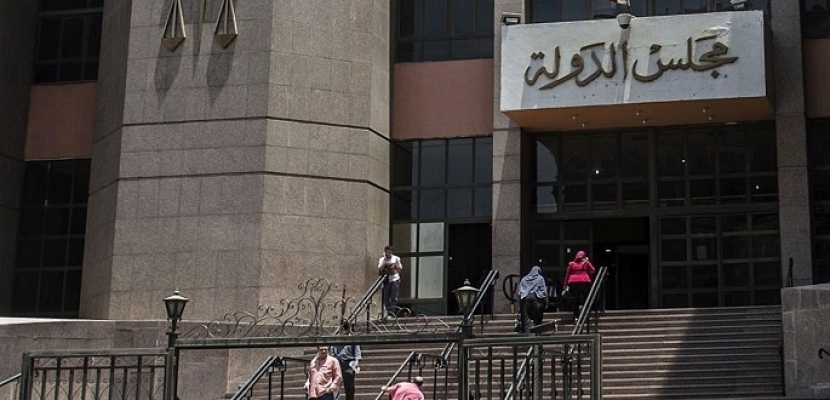Egyptian Authorities Step over the Principle of Judicial Seniority

This July, in a striking move, Judge Yehia Dakrouri filed a judicial appeal with Egypt’s High Administrative Court. Dakrouri, who is the first deputy to the chairman of Egypt’s State Council, was appealing a decision to pass him over for the chairmanship of the State Council. This is despite the fact that he was its most senior member, as well as the first and only candidate for the position put forward by the Council’s General Assembly of Judges.
In filing the appeal, Dakrouri was following the lead of Judge Anas Omara, the most senior judge in the Court of Cassation. Omara recently presented an appeal to the judges’ chamber of the Appeals Court of Cairo. He was contesting a presidential decree that had named Judge Magdy Aboul Ella chairman of the Court of Cassation, despite the fact that Aboul Ella was less senior than Omara.
These developments follow the amendment of legal statutes regarding judicial bodies and the judicial branch, specifically in connection with the way that the heads of judicial bodies are selected. Law 13 of 2017 grants the Egyptian president the authority to appoint the heads of the Supreme Judicial Council (SJC), the State Council, the public prosecution, and the State Litigation Authority. The law specifies that the president should select from among three candidates nominated by each judicial body, chosen by the general assembly of each body from among their seven most senior members.
This is a new procedure for Egyptian judicial bodies, which had previously controlled appointments of their leadership themselves. Before, the body’s general assembly or its highest council would nominate its most senior member for the Egyptian president to ratify. A presidential decree would then be issued confirming the appointment of the chosen judge, without the president’s interference or overruling. Now, however, the authority to select the heads of judicial bodies no longer lies with the bodies themselves, but rather with the Egyptian president. This raises questions about the circumstances leading to the change in the law, and the reasons behind it – not to mention the effects it will have on the judicial independence in Egypt.
Was the law a response to the judges’ opposition to government policies?
In January 2017, the Egyptian House of Representatives sent the judicial bodies the previously mentioned draft law prior to passing it. It met with broad disapproval from all judicial bodies. The State Council, for example, sent an official statement to the House of Representatives in February, announcing their opposition to the law as unconstitutional and a violation of the principle of separation of powers.[1] Likewise, the SJC issued an announcement in March 2017 declaring their rejection of the proposed law in its totality.[2] Parliament’s legislative committee announced that the discussion of the law would be postponed in response to the judges’ demands, and called for studying all proposals put forward.[3] This was despite the fact that the State Council’s legislative division, which is designated to review laws issued by parliament and to determine to what extent they are constitutional, did not agree to the law. It stated that the law violated a number of established constitutional principles and articles.[4]
In a surprise move, however, parliament announced its intention to finalize the law by a specified date, and the parliamentary constitutional and legislative committee debated and approved the law on April 26. The law was sent to the general assembly, which passed it on the same day. The dubious nature of these proceedings raised even more doubts about this “suspect” law.[5]
Indeed, the timing of its deliberation makes the law even more dubious and suspect. It follows the issuing of several decisions considered unfavourable to the wishes of the government, by judges who, by virtue of their seniority, were preparing to take up leadership positions on the two most important judicial bodies in Egypt, namely, the State Council and the SJC. Before the new law was issued, it was presumed that Judge Yehia Ragheb Dakrouri, the vice chair of the State Council, would take up the presidency of that body. Dakrouri is the head of the court that issued a ruling against the maritime boundary agreement between Egypt and Saudi Arabia, an agreement by which Egypt conceded the Tiran and Sanafir islands to Saudi Arabia. This ruling was a source of great embarrassment to political authorities in Egypt, and it was considered the first in a series of episodes of confrontation between the judicial branch and the current government.
Consequently, many have suggested that one of the reasons the amended law was issued in the first place was specifically to prevent Dakrouri from assuming the chairmanship of the State Council, in retaliation for issuing the ruling. Indeed, Dakrouri was passed over for the chairmanship in favor of Judge Ahmed Aboul Azm, head of the court’s legislative division, who was appointed instead on July 19, 2017.[6]
Notably, the State Council is not the only judicial body whose rulings have taken positions in opposition to the current government. The Court of Cassation has also confronted the regime through issuing a number of rulings from its terrorism division, dismissing cases against members of the Muslim Brotherhood and other individuals. The court described these cases as weak and devoid of proof or sound evidence, arguing that the only arguments supporting the cases were investigations conducted by the security apparatus. The chief judge issuing those decisions was Anas Omara, deputy chair of the Court of Cassation. Based on his seniority, he was presumed next in line to the chairmanship of the SJC this year in accordance with the old law. But instead, he was sidelined by a presidential decree issued on June 29, 2017 that appointed Magdy Aboul Alaa.[7]
Judges Refuse to Obey an “Unconstitutional” Law
In an unprecedented move and a clear challenge to the changes in the law on appointing leaders of judicial bodies, on May 13, 2017 the State Council’s General Assembly of Judges decided to nominate Dakrouri as the sole nominee for the presidency of the Council. It was based on the fact that he was the most senior member.[8]
In doing so, they disregarded the new law’s stipulation that they put forward three names for the president to choose from. The judges of the State Council have thereby made known once again their official position on the law. This follows, as mentioned, the statement they sent to parliament indicating their opposition to the law, as well as their legislative division’s rejection of the law during its review.
It is clear that we are currently facing another chapter in the battle over the appointments of heads of judicial bodies; as previously mentioned, in a new challenge to the amended law discussed here, Dakrouri and Omara have both filed judicial appeals. They are moving to strike down the decrees appointing less senior judges and bypassing their own appointments, on grounds of its violation of judicial custom rooted in the principle of seniority in these matters. But their appeals go even further, emphasizing that the new law violates the Constitution as well as the independence of the Egyptian judiciary. Dakrouri made a particular point of addressing the Egyptian president’s decision to pass him over. He wrote:
“Your Excellency’s decree appointing a less senior colleague to the chairmanship of the State Council, thereby passing over me, is an act that has not taken place for over 70 years; it has no clear justification, nor is it a response to a demonstrated need. It violates the basis of seniority upon which the judicial structure is ordered; dismantling this foundation affects the proper functioning of justice.”[9]
If the law was indeed intended to thwart certain individuals who are not acquiescent to those in power, and prevent them from leading the two most important judicial bodies in Egypt, then it is clear that the executive branch is blatantly attempting to impose its dominance and control over the reins of the judiciary. This poses a true threat to the independence of Egypt’s judicial branch.
The Dismissal of the Principle of Seniority and Its Effects on Judicial Independence
“The judge’s qualification, which warrants his appointment in a specific order among his colleagues, equally qualifies him for other judicial positions, unless there is justification otherwise. It is also accepted that a judge’s seniority in relation to his colleagues in a given judicial position, is maintained as as he moves into higher office.”[10]
This was the basis for a ruling by the Supreme Constitutional Court concerning the appointment of a judge; it reflects the extent to which the principle of seniority is rooted in the way that appointments are handled within the Egyptian judicial system.
Judicial custom has operated according to the principle of seniority among judges in appointments for various positions, to the point that seniority has become a part of Egypt’s judicial heritage. This can be inferred from the rulings of both the Supreme Constitutional Court and the High Administrative Court, which demonstrate that this principle is a cornerstone that cannot be removed. It is a pillar of stability in the work of the judiciary, ensuring neutrality and competence on the basis that the most senior judges, and those who have spent the most years administering justice, have experience and capabilities that make them fit for high office. According to the judges themselves, this principle prevents the executive branch or others from interfering with matters related to judicial appointments.
Moreover, the current Egyptian Constitution affirms the principle of seniority as the sole standard in the judiciary in this regard. Article 159 of the Constitution which specifies procedures for a special court to try the president of the republic, stipulates that if a member is prevented from serving, his next most senior colleague should take his place. Similarly, Article 209 states that the chairman of the National Elections Commission should be the most senior judge of the Court of Cassation.
Notably, even the new law itself establishes the principle of seniority. In its amended version, Article 83 regarding the State Council, states:
“The chairman of the State Council is appointed by presidential decree and selected from among three of the council’s seven most senior deputies of the chairman, whose names are put forth by the State Council’s General Assembly, comprising the State Council’s chairman, his deputies and proxies, and judges that have held their position for a period of at least two years. He serves for a period of four years or until the age of retirement…Should there be no nominees named before the end of the period specified in the previous section, or if fewer than three nominees are put forward, or if the nominees do not fit the criteria described above, the President shall appoint a chairman of the State Council from among the seven most senior deputies.”
The legislator thus established seniority as a standard of qualification by setting the condition that the three nominees for the chairmanship selected by the general assembly be from among the seven most senior of the chairman’s deputies. But when it comes to the selection of which nominee should be chairman, it relinquishes this standard, placing the authority to make the appointment in the hands of the president of the republic. Thus, while the new law does not forego the principle of seniority completely, it does modify it somewhat by granting more latitude to the executive branch to control the judicial bodies. This change is seen to be the law’s true objective.
We do not seek to defend the principle of seniority in an absolute sense; nor would we claim that it is the best system. Many states follow different methods in appointing the heads of judicial bodies and forming high courts. For example, in some systems, the president appoints some positions and parliament appoints others; others resort to elections. But it is certain that applying the principle of seniority is the most appropriate means for the Egyptian judicial system today.
Egypt is currently experiencing a period of radical political shifts; the foundations of democratic rule have not stabilized within the state. This means that any executive or legislative interference with the running of the judiciary is an action that could be used to weaken the institution, or to dominate it for the benefit of the faction in power. This would amount to a violation of the separation of powers principle, which is the foundation of sound democratic rule.
According to the statutes of the former law, and keeping with the principle of seniority, it was once easy to know who would chair judicial bodies for years to come. Each judge had a rank of seniority, in an order that nobody overstepped. As a result, there were no struggles within judicial institutions over who would be the next chairman. This has had a positive effect on the efficacy of judicial work within the various bodies, as well as their stability.
With the new state of affairs, however, and a law that paves the way for the executive branch to choose whom they deem most suitable, problems and conflicts may emerge within the various judicial bodies. The door has been opened for judges covetous of high office to curry favor with the executive branch. This would threaten not only the independence of the judiciary, but the justice system more broadly.
Conclusion
Advancing the work and functioning of the judiciary in Egypt is a necessity. Advocates for the independence of the judiciary have long argued for changing the way that leaders of judicial bodies are selected, and laying the groundwork for their members to be chosen by election. They have called for setting aside the standard of seniority in selection, and instead shifting to a standard of competence.
But the amendment to the law on selecting heads of judicial bodies has not answered these demands, nor is its goal the independence of the judicial branch. Rather, it aims to strengthen the executive’s control over the reins of the judiciary. And it has come at a time when the executive branch is blatantly exercising its dominance over the legislative branch and intimidating any voice that so much as appears to oppose it.
This is in addition to the fact that the law is suspected of being a form of retribution against judges themselves, on account of positions they took while serving on the judicial bench. Hence, it sends a clear message to any judge who considers ruling in a way that the political authorities will dislike, namely, that their professional future is under threat. It paints a clear picture of the current authorities’ desire to add to the judiciary’s problems, rather than advance its work and guarantee its independence.
This article is an edited translation from Arabic.
__________
[1] See: “State Council rejects Parliament’s draft law on judicial bodies…deputy: opinion of the consultative council”, Mada Masr, February 2, 2017.
[2] See: “By consensus, Supreme Judiciary rejects draft law on selecting leadership of judicial bodies”, Al-Youm Al-Sabaa, March 12, 2017.
[3] See: “Parliament’s legislative division delays discussion of amendment of law on the judicial branch”, Al-Youm Al-Sabaa, March 13, 2017.
[4] See: “Official statement: Legislative division informs parliament of rejection of amended law on judicial bodies”, Al-Youm Al-Sabaa, April 15, 2017.
[5] See: “Official statement: Parliament passes law on the judicial branch”, Egyptian Parliament website, April 26, 2017.
[6] See: “Presidential decree appoints Judge Ahmed Aboul Azm chairman of State Council”, Al-Youm Al-Sabaa, July 19, 2017.
[7] See: “Meet the new chairman of the Court of Cassation, Magdy Aboul Alaa”, Al-Youm Al-Sabaa, June 29, 2017.
[8] See: “Official statement of State Council: Candidacy of Yehia Dakrouri supported by majority of general membership”, Al-Youm Al-Sabaa, May 13, 2017.
[9] See: “Text of Dakrouri’s grievance against Sisi: overriding the principle of seniority affects the smooth functioning of justice”, Al-Watan, July 24, 2017.
[10] Appeal No. 1 of Constitutional Judicial Year 23; Ruling 14/4/2002.


